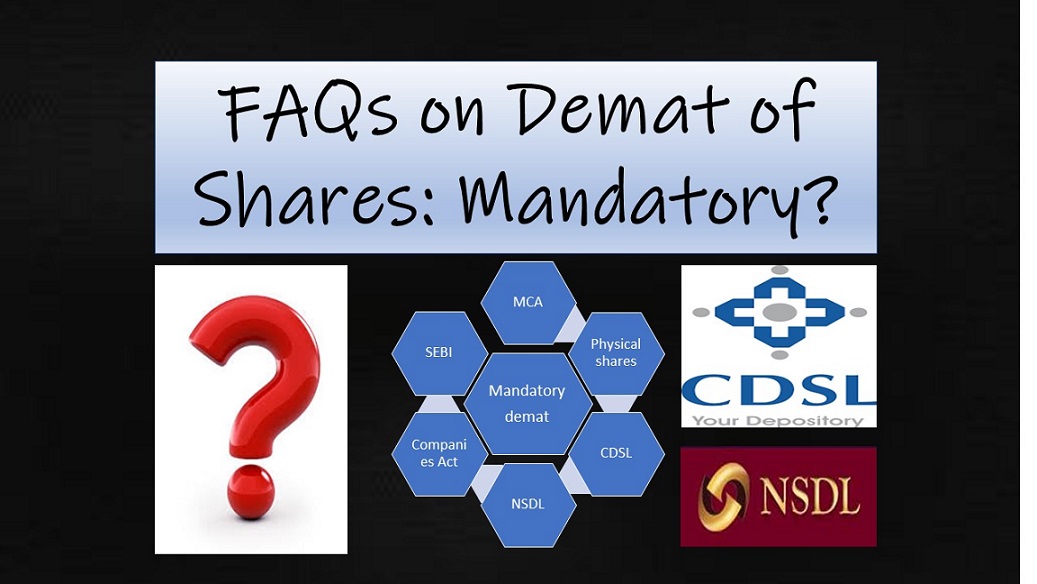
Last updated on July 19th, 2022 at 08:50 am
Is it mandatory to Demat shares
FAQs on Demat of Shares
Ministry of Corporate Affairs (MCA), as well as the Securities Exchange Board of India (SEBI), has come up with notifications on mandatory dematerialization (Demat) of shares. Let us take a look at the provisions and practical questions related to it.
Update: SEBI has extended this deadline to April 1, 2019, from December 5, 2018. Click here to read more about it.
Dematerialization or Demat of shares means converting the physical form of shares into an electronic form. A person holding a physical share certificate can get rid of the physical shares and get it in electronic form. This process is known as the “dematerialization” of shares.
Dematerialization of shares is one of the safest ways to trade in shares. There had been several instances of fraud happening with the physical form of shares. Hence for safe trading, the dematerialized form of shares is recommended. Further, this electronic form of shares is most convenient even for transactions as well as for record-keeping.
It is mandatory for certain companies to issue or transfer the shares only in demat form. However, in certain cases, you can still hold the shares in physical form. Let us understand the provisions in detail:
Listed Public Companies:
As per the Securities Exchange Board of India (SEBI), every listed company is required to issue its shares in dematerialized form. Every person who is holding physical share certificates of a listed company is required to convert the shares in dematerialized form by 5th December 2018. Similarly, any company which wishes to issue, transfer, buyback, or sells the shares, must ensure and facilitate dematerialization of its entire shareholding.
Unlisted Public Companies:
MCA has also come up with a notification on10th Sep 2018 to mandate the dematerialization of shares for all Public Ltd. companies from October 2, 2018. As a result, Unlisted public ltd. companies will have to issue or transfer its shares in demat form. All the shareholders of unlisted public limited companies will have to get their physical shares dematerialized. A company should facilitate dematerialization of its shareholding and before issue, transfer, buyback, or sale of its shares the company should ensure that entire shareholding of its Promotors, Key Managerial Personnel, and directors have been dematerialized.
Private Ltd. and Other Companies:
Private Ltd. companies and Co-Operative societies including Co-Op. Hsg. Societies will continue to keep shares in physical form. However, if a Private Ltd. company wish to convert its physical shares into demat, that can be done by following a systematic procedure.
Yes. Though SEBI issued a directive to dematerialize all the shares of listed companies before 5th Dec 2018, it received many complaints and concerns. Hence in August 2018, SEBI issued a clarification allowing people to hold shares in physical form even after 5th December 2018. However, if a person wants to transfer/sell those shares, that can be done only after the shares are dematerialized. In short, even if you hold the shares in physical form, you need to demat it before sale/transfer.
No. As per Rule 9A sub-rule (3) of the Companies (PAS) Rules 2018, a person who is holding physical shares of a company cannot subscribe for bonus/rights issue or buyback of shares unless the shares are in dematerialized form.
In order to dematerialize shares, you need to open a Demat Account with Depository Participant (DP). If you are a company and want to dematerialize shares, you need to first obtain ISIN. Please click here to see our post on a detailed step-by-step guide to dematerialize shares.
- How to do a transaction in Digital Rupee (CBDC-R)? – A Step by step Guide - 10/12/2022
- Can you rectify your 26AS? - 20/09/2022
- Tax implications on Cashback - 09/09/2022
Disclaimer: The above content is for general info purpose only and does not constitute professional advice. The author/ website will not be liable for any inaccurate / incomplete information and any reliance you place on the content is strictly at your risk.
Follow us on Social Media by clicking below
Follow @financepost_in


Be the first to comment